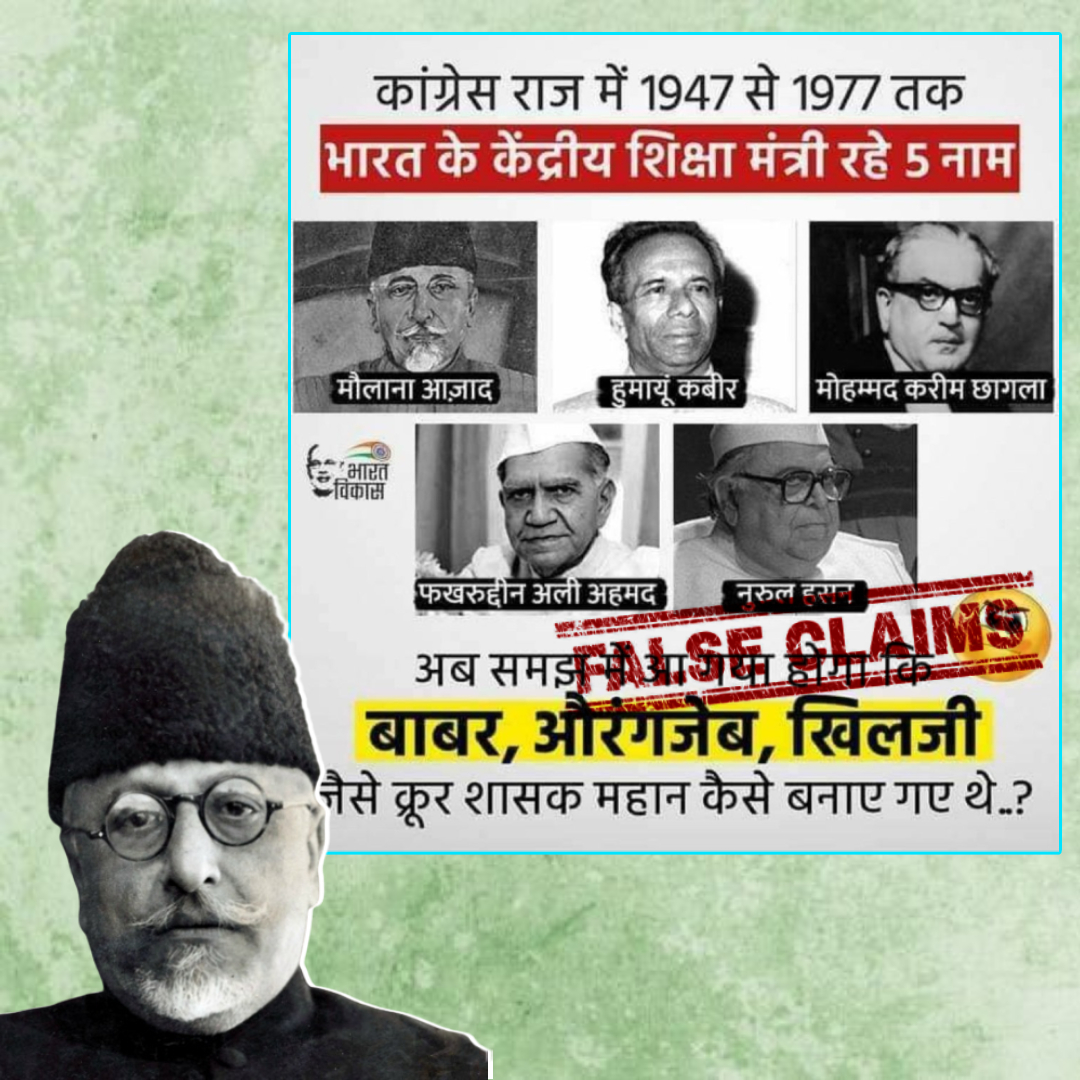
Image Credit: WhatsApp, Wikipedia/Abul Kalam Azad
No, First Five Indian Education Ministers Appointed Under Congress Rule Were Not Just Muslims
Writer: Jakir Hassan
A journalist at heart loves the in-depth work of reporting, writing, editing, research, and data analysis. A digital and social media enthusiast.
India, 6 Jun 2022 11:25 AM GMT | Updated 6 Jun 2022 12:02 PM GMT
Editor : Bharat Nayak |
As the founding editor, Bharat had been heading the newsroom during the formation years of the organization and worked towards editorial policies, conceptualizing and designing campaign strategies and collaborations. He believes that through the use of digital media, one could engage the millennial's in rational conversations about pertinent social issues, provoking them to think and bring a behavioral change accordingly.
Creatives : Jakir Hassan
A journalist at heart loves the in-depth work of reporting, writing, editing, research, and data analysis. A digital and social media enthusiast.
The viral post claims that the five Education ministers of India were Muslims which implies that the Congress government had appointed them in a move to appease Muslims. As per the posts, these Muslim education ministers had promoted the glorification of Mughal rulers such as Babur, Aurangzeb, and Khilji in the Indian education system.
An image has gone viral across social media which claims that the first five Education Ministers of India were Muslims. The image has been shared in the context of growing misinformation intended to incite communal tensions in the country.
In the past, there has been misinformation circulated across social media that claims that Muslims are radicalising children in madrasas. The Logical Indian Fact Check Team has countered such claims in the past, as can be seen from this report.
Claim:
The image has gone viral across WhatsApp. The Logical Indian Fact Check Team received several messages on our WhatsApp fact check no. +91-6364000343 requesting to fact check this claim.
The viral image shows text overlaid on the top and bottom of the image. The image contains five portraits of the different ministers of India. The text under the photos reads as follows.
1. Maulana Abul Kalam Azad
2. Humayun Kabir
3. Mohammad Karim Changla
4. Fakhruddin Ali Ahmed
5. Nurul Hasan
The text on the top reads: "कांग्रेस राज में 1947 से 1977 तक भारत के केंद्रीय शिक्षा मंत्री रहे five नाम" (Translation: 5 names who were the Union Education Minister of India from 1947 to 1977 under Congress rule)
The text on the bottom reads: "अब समझ में आ गया होगा कि बाबर, औरंगजेब, खिलजी जैसे क्रूर शासक महान कैसे बनाए गए थे...?" (Translation: Now it must be understood how cruel rulers like Babur, Aurangzeb, Khilji were glorified)
Screengrabs of requests received on the TLI WhatsApp fact check number
The viral post claims that the five Education ministers of India were Muslims which implies that the Congress government had appointed them in a move to appease Muslims. As per the posts, these Muslim education ministers had promoted the glorification of Mughal rulers such as Babur, Aurangzeb, and Khilji in the Indian education system.
BJP senior leader Sushil Kumar Modi had shared a similar claim through a post uploaded on March 4, 2021. The caption of the post reads: "Why the first 5 education ministers of the country belonged to the same community?"
We also found this infographic viral on Twitter back in 2021 as well.
Fact Check:
The Logical Indian fact check team verified the claim and found it to be false. The first five education ministers of India were not all from the Muslim community.
We conducted a keyword search for finding out the first five Education Ministers of India. We came across the following list on an online education website.
Following this, we conducted another keyword search and came across this list on the former Ministers of Education in India on the Ministry of Education website. As can be seen from the list, the first five Education Ministers of India are as follows: Maulana Abul Kalam Azad, Dr. K.L. Shrimali, Humayun Kabir, M.C. Chagla, and Fakhruddin Ali Ahmed. Out of these, Dr. Shrimali does not belong to the Muslim community.
Following Fakhruddin Ali Ahmed's tenure as the Indian Education Minister, Triguna Sen, V. K. R. V. Rao, and Siddhartha Shankar Ray served as the Indian Education Ministers. These leaders did not belong to the Muslim community either.
The second Education Minister of India, Dr. K.L. Shrimali served on his post for five years and 221 days. He was appointed twice to the post, serving from Saturday, February 22, 1958 to Saturday, August 31, 1963.
Following Dr. Shrimali, Humayun Kabir served as the education minister for three months and the fifth education minister was Fakhruddin Ali Ahmed, who served in office for four months. As per data on the Ministry of Education website, Triguna Sen and V.K.R.V Rao served as the Education Ministers for a tenure of 1 year, 335 days and 2 years, 32 days respectively. Their terms ran from 16 March 1967 to 18 March 1971. From 18 March 1971, Siddhartha Shankar Ray served his term as Education Minister for a period of one year and two days to 20 March 1972.
Following this, we conducted keyword searches to discover whether Indian history textbooks were altered by the Congress government of the time. The first Education Minister, Maulana Abul Kalam Azad was known as a secularist and strongly appealed for Hindu-Muslim unity, as noted in this The Logical Indian report. Following his appointment as the Education Minister, he strived to educate all children regardless of socio-economic status or religion.
Regarding M.C Chagla, we came across a statement by him noted by Rakesh Ankit, a history professor at Loughborough University, England in his essay on Chagla. This statement was also noted by researcher Sanjna Sudan in her essay on colonial history.
"The Minister of Education M. C. Chagla was concerned that the textbooks in history should not recite myths but be secular and rational explanations of the past." it reads.
We also came across a report of the Secondary Education Commission published for the period October 1952- June 1953 by the Ministry of Education. The report lays emphasis on the teaching of history, stating that "it should endeavour to give the students not only a sense of national patriotism and an appreciation of national heritage, but also a keen and lively sense of world unity and world citizenship."
The report also clearly states that there should be no discrimination between students on the basis of religion. It is mentioned, "All that is. understood is that the State as such should not undertake to uphold actively, assist, or in any way to set its seal of approval' on any particular reiigion."
As per the essay, History textbooks in India: Narratives of religious nationalism written by K.K. Panikkar, the post-independence Congress government attempted to reform the "religious-communal baggage on the teaching of history." The government had set up the National Council for Educational Research and Training (NCERT) in 1961 for achieving this objective.
As per the essay, the post-independence Congress government attempted to teach history as "per a perception of multi-cultural and multi-religious national identity and its commitment to a secular-democratic polity"
Neeladri Bhattacharya, author and former professor at JNU, stated the same in his essay, The Teaching History in Schools: the Politics of Textbooks in India published in 2009.
He states: "The intellectuals of this new India struggled to create a secular and democratic public culture….Historians turned to the past to counter communal representations of history, question communal stereotypes and write a secular national history. The history textbooks written in the 1960s embodied this secular nationalist ideal."
Conclusion:
We found in our investigation that the first five education ministers of India were not all from the Muslim community. Under the post-indepedence Congress rule, there were four political leaders, Dr. K.L. Shrimali, Triguna Sen, V.K.R.V Rao and Siddhartha Shankar Ray who did not belong to the Muslim community.
Apart from this, former education ministers, M.C Chagla and Maulana Abul Kalam Azad had promoted Hindu-Muslim unity and the "secular and rational explanations of the past". As we found out, several historians and scholars have pointed out that the post-independence Congress government attempted to teach history without the communal-colonial baggage of the British Raj. The claim that the Muslim education ministers had promoted the glorification of Mughal rulers such as Babur, Aurangzeb, and Khilji is false and aims to spread communal tensions.
If you have any news that you believe needs to be fact-checked, please email us at factcheck@thelogicalindian.com or WhatsApp at 6364000343.
Also Read: Did CM Ashok Gehlot Insult Lord Ram In A Speech? No, Viral Video Shared Without Context!
 All section
All section














